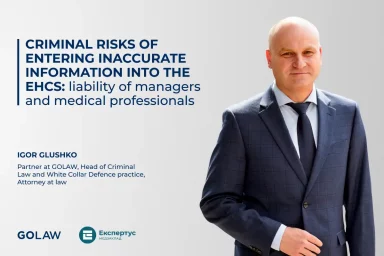‘Golden parachutes’ for top managers in Ukraine
Contents
The Labor Code of Ukraine, adopted in the Soviet Union in 1973, is the country’s main labor law. Despite numerous changes, this document is rather outdated and does not sufficiently regulate dismissing employees.
Labor disputes are usually emotional, even more so when the director, chief accountant or other senior employees are dismissed. In case of dismissal, top managers often expect to receive additional rewards, bonuses and other incentive payments. Let us examine what kind of payments can be claimed by a top manager in Ukraine upon dismissal.
Mandatory payments
When dismissing any employee, the employer is obliged to settle full payment owed to the employee on the day of the dismissal. This payment includes the relevant salary and compensation for unused leave. If such payments are not made on time, the employee may sue the employer for the average salary during the entire period of delay until the date of actual payment.
Upon termination of the employment contract on certain grounds specified by the law, the manager must be given severance pay. The amount of severance pay depends on the grounds for dismissal.
The largest severance pay available to managers amounts to six monthly salaries. The manager receive this amount when dismissed on grounds prescribed by paragraph 5 of part 1 of Article 41 of the Labour Code. When this happens, the employer is not obliged to establish the employee’s fault or explain the reasons for dismissal. Currently, this is the largest “golden parachute”, directly provided by the legislation of Ukraine. Its size serves as a counterweight to the business owner’s right to fire a manager at any time without warning.
At the discretion of the employer
In Ukraine, the salary structure includes incentive and compensation payments in the form of payoffs, rewards and bonuses, which are not provided by the law.
The amount and terms of bonus payments may be set out in the collective agreement, as well as internal company policy. Moreover, the payment of additional bonuses for achieving certain performance indicators may be set out directly in the employment contract with the top manager.
As a rule, company policies envisage that the payment of rewards and bonuses, which are not mandatory by law, are at the discretion of the employer. The company’s internal documents may also require the company’s profitability to be a mandatory condition for the payment of rewards to employees.
The case law of the Supreme Court confirms that the decision to pay rewards and bonuses to the top manager is the exclusive prerogative of the business owner.
For instance, in court case No.753/6075/17-ts, the Supreme Court confirmed the absence of grounds for recovering a reward from a former employer in favour of the chief accountant. The payment of the bonus had not been agreed on by the general meeting of participants and the director of the company, which is mandatory under the regulations on remuneration and rewards.
In case No. 201/532/20 one of the dismissed managers of a bank asked the court to recover bonus payments of more than UAH 500,000. The court rejected the employee`s claims and stated that according to the Regulations on variable remuneration, the decision of the employee`s manager shall be the grounds for the payment of all types of remuneration, meaning that only the manager can decide whether to pay the non-mandatory bonus. The court also stated that it could not assume the function of determining bonuses instead of the body entrusted with such powers, and could not interfere in the economic activity of the bank.
By mutual consent of the parties
The labour legislation does not prohibit the parties from agreeing on dismissal compensation or other bonuses that the law does not cover. Such an agreement predominantly takes place during the negotiated resignation (paragraph 1 of part 1 of Article 36 of the Labour Code). In this case, employers and top managers, as a rule, enter into a written agreement on termination of employment. Such agreements state the grounds and date of dismissal, the terms of employee`s handover of responsibilities and the return of valuables, and also may establish additional payments and compensation.
Conclusions
When dismissing a top manager, as well as any other employee, the employer is obliged to cover their full unpaid salary and compensation for unused leaves. The payment of additional bonuses and rewards, which are not directly established by the law, depends on the employer’s decision and employment contracts with top managers. The payment of additional bonuses, which are not provided by the law, may be envisaged in a separate written agreement between the parties.

Kateryna Tsvetkova
Partner, Litigation and Dispute Resolution practice, Attorney at law
- Contacts
- 31/33 Kniaziv Ostrozkykh St, Zorianyi Business Center, Kyiv, Ukraine, 01010
- k.tsvetkova@golaw.ua
- +38 044 581 1220
- Recognitions
- Lexology Index: Client Choice 2026
- Lexology Index: Employment & Labor 2025
- The Legal 500 EMEA 2025
- Lexology Index: Restructuring & Insolvency 2026
Sign up to be aware
New achievements are inspired by information. GO further, don’t miss out GOLAW news and legal alerts
Our expertise
-
- Energy and Natural Resources
- Antitrust and Competition
- Banking and Finance
- Compliance, Corporate Governance and Risk Management
- Corporate and M&A
- Criminal and White Collar Defence
- Defense in Anti-corruption procedures and regulations
- Digital Economy Practice
- Labor and Employment
- Natural Resources and Environment
- Government Relations (GR)
- Insolvency and Corporate Recovery
- Intellectual property
- International trade
- Legal support of business and private Сlients in Germany
- Litigation and dispute resolution
- Private clients
- Real Estate and Construction
- Restructuring, Claims and Recoveries
- Martial Law
- Tax and Customs
-
- Agribusiness
- Aviation
- Chemical industry
- Engineering, Construction and Building Materials
- Environment and Natural Resources
- Financial institutions
- IT and AI
- Industry and manufacturing
- Healthcare industries, Life sciences and Pharmaceuticals
- Media, Entertainment, Sports and Gambling
- Retail, FMCG and E-Commerce
- Transport and Logistics
We use cookies to improve performance of our website and your user experience.
Cookies policy
Cookies settings







